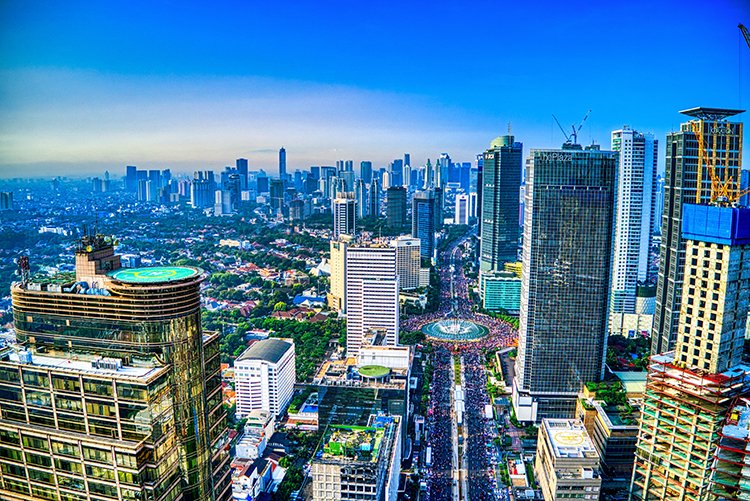The majority of key international institutions predict Indonesia’s economic performance this year will slow down compared to last year’s 5.3-percent growth, according to reporting from KataData. However, several institutions in their latest reports have given hope that the slowdown may not be as deep as previously anticipated.
Minister of Finance Sri Mulyani, estimates that Indonesia’s economic growth this year will be between 5 to 5.3-percent. This prospect is supported by public consumption, which is still relatively strong and government consumption growth is expected to return to the positive zone driven by strong spending on goods.
However, in her presentation Sri Mulyani also noted that there were several factors suppressing growth. These include construction investment, which is still holding up even though non-building investment is relatively stable. The export trend is also likely to be slow but the import slowdown will still be deeper.
“With good consumer confidence, investment and in terms of relatively stable export-import growth, the trade balance is also still in surplus, we can see that our economic growth is relatively stable,” said Sri Mulyani in a press conference on the March edition of the KiTA State Budget.
KataData report that Bank Indonesia (BI) estimates that economic growth in 2023 will be able to go up within the projected range of 4.5 to 5.3-percent, in other words it is likely to be around 5-percent. Growth remained strong on the back of rising domestic demand and positive export performance. If the government and BI are still optimistic that Indonesia’s economic growth this year will last around 5-percent, then what are the projections of a number of international institutions?
The following is a summary of the projections of those key international institutions:
The International Monetary Fund (IMF) has raised Indonesia’s economic growth projection this year from the previous estimate of 4.8 to 5-percent. The rapid recovery of the Chinese economy is expected to have a positive effect on Indonesia. Even so, Indonesia could not avoid a slowdown from last year which managed to grow by up to 5.3-percent. The slowdown was driven by the normalization of commodity prices due to the monetary tightening cycle, which hit the economy and global demand. However, the IMF sees that Indonesia’s economic risks are currently quite balanced. Several positive factors for the Indonesian economy, namely a faster recovery in China and easing global inflationary pressures can strengthen demand for Indonesian exports, report KataData.
The World Bank (WB) also raised its projection for Indonesia’s economic growth this year to 4.9-percent from the January report of 4.8-percent. However, growth will indeed slow down from last year. The agency sees that growth in Indonesia and other Asia Pacific countries will still be driven by strong domestic demand. Private consumption faces debt burden challenges and financial market pressures due to a high global interest rate environment.
The tightening of global monetary policy will also weigh on investment, coupled with the high uncertainty in the external environment. The contribution of exports to growth is also likely to decline due to moderating commodity prices amid weak demand.
The Asian Development Bank (ADB) predicts Indonesia’s economic growth will be 4.8-percent this year, unchanged from their December estimate, say KataData. Growth will be supported by normal domestic consumption and reduced inflationary pressure. However, global economic pressure in 2023 will hit export demand so that growth will not be as high as last year. It is also possible that investment will not strengthen because the business world is still assessing current conditions.
The Organization for Economic Cooperation and Development (OECD) estimates that Indonesia’s economic growth this year will be 4.7-percent. The projection has not changed from the November report, say KataData. The OECD sees that the economic prospects of emerging Asian countries, including Indonesia, tend to be less affected by the world economic slowdown. This was helped by the recovery in China and more moderate inflationary pressures.
The ASEAN+3 Macroeconomic Research Office (AMRO) estimates that Indonesia’s economic growth this year will still be strong with the possibility of growing 5-percent. This performance was supported by resilient domestic demand despite the slowing global outlook, say KataData. Indonesia’s inflation is also considered to be relatively stable compared to other countries, and has even started to moderate recently. Indonesia’s near-term prospects are weighed down by risks of a global slowdown and a potential recession in some of its major trading partners. Meanwhile, the worsening world energy crisis could exacerbate inflation so that monetary tightening in the US also has the potential to continue. However, there is hope that the easing of the zero Covid-19 policy in China will benefit Indonesia, one of which is the tourism sector.
Source: KataData


